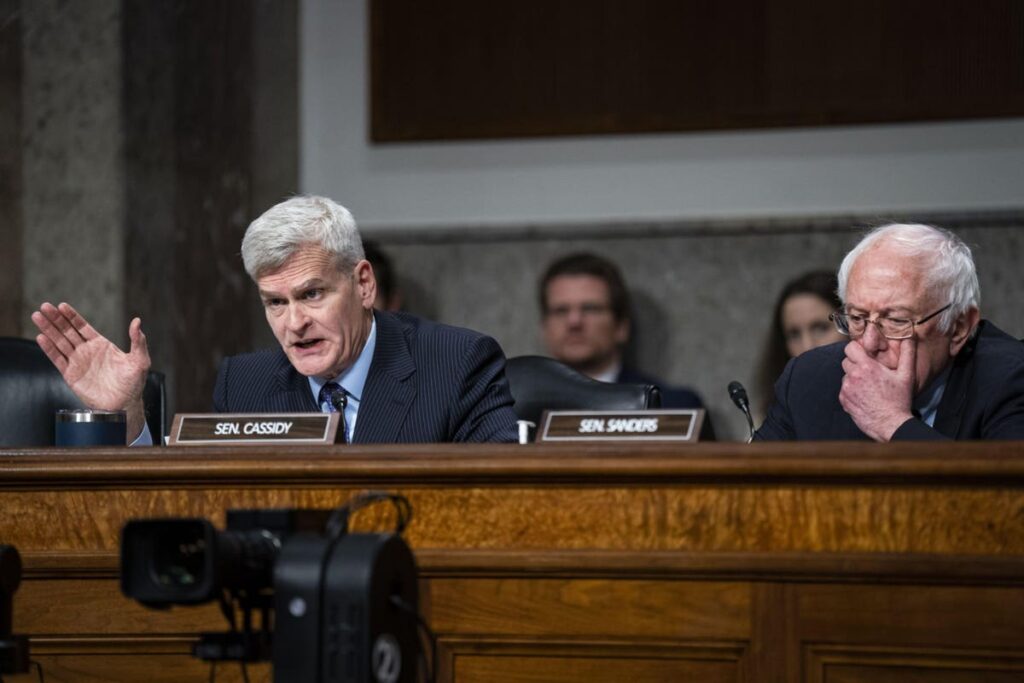Senator Bill Cassidy, a Republican from Louisiana and ranking member of the Senate Health, … [+]
This week, the Senate Health, Education, Labor and Pensions Committee advanced four new bills related to pharmacy benefit manager (PBM) and Food and Drug Administration reforms. This follows passage of five bipartisan bills out of the Senate Judiciary Committee in February.
The key piece of legislation, known as the Pharmacy Benefit Manager Reform Act, was ultimately agreed to by a vote of 18-3. This implies that the legislation will go to the floor of the Senate to be debated and eventually voted on.
The Pharmacy Benefit Manager Reform Act (S. 1339), led by Chairman Sanders (I-VT) and Ranking Member Cassidy (R-LA), bans spread pricing and certain claw backs by PBMs, and requires that rebates be passed through to plan sponsors.
Spread pricing is the practice of PBMs charging health plans more than they pay the pharmacy for a medication, and then the PBM keeps the “spread” or difference as profit. Rebates are payments from drug manufacturers to PBMs in exchange for moving market share towards preferred products on the formulary. The claw backs referenced in the bill concern direct and indirect remuneration fees incurred by pharmacies that dispense Medicare Part D (outpatient) drugs. Such fees can be charged by PBMs long after a pharmacy has filled a Medicare prescription.
This bill and others that have advanced to the Senate floor have as their overarching objective an increase transparency into the opaque practices of PBMs. However, there’s been some watering down of PBM reform initiatives.
The proposed legislation requires pass-through of PBM rebates to employers and other plan sponsors, but not to patients. This means that patients don’t necessarily stand to gain from the pass-through. The hope is that plan sponsors will lower premiums and other out-of-pocket beneficiary spending. But that’s far from certain.
Furthermore, though supported by Senators across the aisle, the bills no longer delink PBM compensation from the (list) prices of drugs. This is a rather stunning omission, in that the linkage of PBM earnings to list prices of drugs – the higher the list price, the higher the rebate and other fees – has been the cause of a perverse incentive structure, in which in many instances higher-priced drugs are favored on formulary. In turn, patients wind up paying more out-of-pocket. After all, patients’ co-insurance is calculated on the basis of list and not net prices.
Delinkage is absolutely essential to reform the PBM business model. But the Senate balked at including it in the legislation package, evidently because of a lack of a Congressional Budget Office score.
In the grind that often characterizes the U.S. legislative process, progress is usually measured incrementally. And so, it’s a significant step forward when there’s consensus among key lawmakers on what they deem to be “unlawful activities” for PBMs to engage in, which include spread pricing, rebates, and claw backs.
What’s more, legislators agree on implementing changes to the formulary management system that are aimed at protecting patients, including a mandate that employer-sponsored health plans offer a medically reasonable and expedient step therapy exceptions process. Step therapy occurs when an insurer or PBM refuses to cover the cost of a medication until a patient tries and fails on a different – usually less costly – treatment in the same therapeutic class.
Overall, there is strong bipartisan support for PBM reform and increased oversight. Moreover, it’s a two-pronged attack on PBMs, with Congressional proposals running parallel with an ongoing Federal Trade Commission inquiry into alleged “anti-competitive practices.” PBMs have been in the crosshairs of Congress and the Federal Trade Commission for quite some time.
It’s still unclear precisely how the legislation would work in tandem with the parallel FTC inquiry. But if the FTC finds evidence of anti-competitive practices, enforcement of punitive action would be bolstered by having laws on the books.
Unlike other more contentious areas of political debate, PBM reform efforts enjoy broad support from lawmakers, doctors, pharmacies, the Pharmaceutical Research and Manufacturers of America, and patient advocacy entities. The organization Patients For Affordable Drugs Now, for example, has applauded the moves by the Senate. It says the “package of bills represents a significant step towards restoring accountability to the U.S. drug price system so that it prioritizes patients, rather than the bottom line of the pharma and PBM industries.”
Given the agreement on PBM reform across a disparate group of stakeholders, perhaps the two missing components in the proposed legislation – pass-through to patients and delinkage of PBM rebates and fees from list prices – will eventually find a way to be incorporated in future bills.


